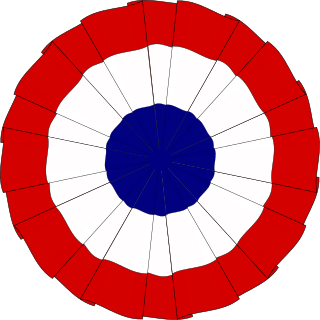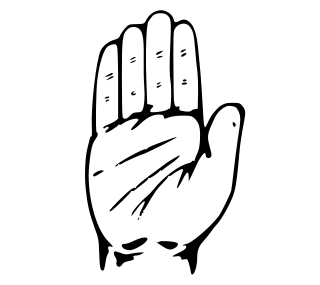
The Bolsheviks, also known in English as the Bolshevists, were a radical, far-left, Marxist faction founded by Vladimir Lenin and Alexander Bogdanov that split from the Menshevik faction of the Marxist Russian Social Democratic Labour Party (RSDLP), a revolutionary socialist political party formed in 1898, at its Second Party Congress in 1903.
Conservatism is a political and social philosophy promoting traditional social institutions in the context of culture and civilization. The central tenets of conservatism include tradition, organic society, hierarchy, authority, and property rights. Conservatives seek to preserve a range of institutions such as religion, parliamentary government, and property rights, with the aim of emphasizing social stability and continuity. The more traditional elements—reactionaries—oppose modernism and seek a return to "the way things were".

The Chinese Communist Party (CCP), officially the Communist Party of China (CPC), is the founding and ruling political party of the People's Republic of China (PRC) and the second largest political party in the world after India's Bharatiya Janata Party. The CPC is the sole governing party within mainland China, permitting only eight other, subordinated parties to co-exist, those making up the United Front. It was founded in 1921, chiefly by Chen Duxiu and Li Dazhao. The party grew quickly, and by 1949 it had driven the Kuomintang (KMT)'s Nationalist Government from mainland China to Taiwan after the Chinese Civil War, leading to the establishment of the People's Republic of China. It also controls the country's armed forces, the People's Liberation Army.

The National Socialist German Workers' Party, commonly referred to in English as the Nazi Party, was a far-right political party in Germany that was active between 1920 and 1945, that created and supported the ideology of National Socialism. Its precursor, the German Workers' Party, existed from 1919 to 1920.

The Libertarian Party (LP) is a political party in the United States that promotes civil liberties, non-interventionism, laissez-faire capitalism, and limiting the size and scope of government. The party was conceived in August 1971 at meetings in the home of David F. Nolan in Colorado Springs, Colorado, and was officially formed on December 11, 1971 in Colorado Springs, Colorado. The founding of the party was prompted in part due to concerns about the Nixon administration, the Vietnam War, conscription, and the introduction of fiat money.

The Republican Party, also referred to as the GOP, is one of the two major contemporary political parties in the United States, along with its main, historic rival, the Democratic Party.
The Whig Party was a political party active in the middle of the 19th century in the United States. Alongside the Democratic Party, it was one of the two major parties in the United States during the late 1830s, the 1840s, and the early 1850s, part of the Second Party System. Four U.S. presidents were affiliated with the Whig Party for at least part of their respective terms. Other influential party leaders include Henry Clay, Daniel Webster, William Seward, John J. Crittenden, and Truman Smith.

The Democratic-Republican Party, better known at the time as the Republican Party and various other names, was an American political party founded by Thomas Jefferson and James Madison in the early 1790s that championed republicanism, political equality, and expansionism. The party became increasingly dominant after the 1800 elections as the opposing Federalist Party collapsed. The Democratic-Republicans later splintered during the 1824 presidential election. One faction of the Democratic-Republicans eventually coalesced into the modern Democratic Party, while the other faction ultimately formed the core of the Whig Party.

The Federalist Party was the first political party in the United States. Under Alexander Hamilton, it dominated the national government from 1789 to 1801. It became a minority party while keeping its stronghold in New England and made a brief resurgence by opposing the War of 1812. It then collapsed with its last presidential candidate in 1816. Remnants lasted in a few places for a few years. The party appealed to businesses and to conservatives who favored banks, national over state government, manufacturing, an army and navy, and in world affairs preferred Great Britain and opposed the French Revolution.
The Conservative Party, officially the Conservative and Unionist Party, and also known colloquially as the Tories or simply the Conservatives, is a centre-right political party in the United Kingdom. The governing party since 2010, it holds an overall majority in the House of Commons with 365 Members of Parliament. It also has 245 members of the House of Lords, 8 members of the London Assembly, 31 members of the Scottish Parliament, 11 members of the Welsh Parliament and 7,430 local councillors.

The Bharatiya Janata Party is the current ruling political party of the Republic of India. It is one of the two major political parties in India, along with the Indian National Congress. As of 2019, it is the country's largest political party in terms of representation in the national parliament and state assemblies and is the world's largest party in terms of primary membership. BJP is a right-wing party, and its policy has historically reflected Hindu nationalist positions. It has close ideological and organisational links to the much older Rashtriya Swayamsevak Sangh (RSS).

The Indian National Congress is a political party in India with widespread roots. It is one of the two major political parties in India, along with the Bharatiya Janata Party. Founded in 1885, it was the first modern nationalist movement to emerge in the British Empire in Asia and Africa. From the late 19th century, and especially after 1920, under the leadership of Mahatma Gandhi, Congress became the principal leader of the Indian independence movement. Congress led India to independence from Great Britain, and powerfully influenced other anti-colonial nationalist movements in the British Empire.
An independent or nonpartisan politician is a politician not affiliated with any political party. There are numerous reasons why someone may stand for office as an independent:

The Democratic Party is one of the two major contemporary political parties in the United States, along with its main rival, the Republican Party. Tracing its heritage back to Thomas Jefferson and James Madison's Democratic-Republican Party, the modern-day Democratic Party was founded around 1828 by supporters of Andrew Jackson, making it the world's oldest active political party.

The Labour Party is a centre-left political party in the United Kingdom that has been described as an alliance of social democrats, democratic socialists and trade unionists. In all general elections since 1922, Labour has been either the governing party or the Official Opposition. There have been six Labour Prime Ministers and eight ministries.

The United States House of Representatives is the lower house of the United States Congress; the Senate is the upper house. Together they compose the national bicameral legislature of the United States.

The Black Panther Party (BPP), originally the Black Panther Party for Self-Defense, was a revolutionary socialist political organization founded by Marxist college students Bobby Seale (Chairman) and Huey Newton in October 1966 in Oakland, California. The party was active in the United States from 1966 until 1982, with chapters in numerous major cities, and international chapters in the United Kingdom in the early 1970s, and in Algeria from 1969 to 1972. At its inception on October 15, 1966, the Black Panther Party's core practice was its open carry armed citizens' patrols ("copwatching") to monitor the behavior of officers of the Oakland Police Department and challenge police brutality in the city.

The United States Senate is the upper chamber of the United States Congress, which, along with the United States House of Representatives—the lower chamber—constitutes the legislature of the United States. The Senate chamber is located in the north wing of the Capitol Building in Washington, D.C.

The 2020 United States presidential election is scheduled for Tuesday, November 3, 2020. It will be the 59th quadrennial presidential election. Voters will select presidential electors who in turn will vote on December 14, 2020, to either elect a new president and vice president or reelect the incumbents Donald Trump and Mike Pence respectively. The series of presidential primary elections and caucuses are being held from February to August 2020. This nominating process is an indirect election, where voters cast ballots selecting a slate of delegates to a political party's nominating convention, who then, in turn, elect their party's nominees for president and vice president.















